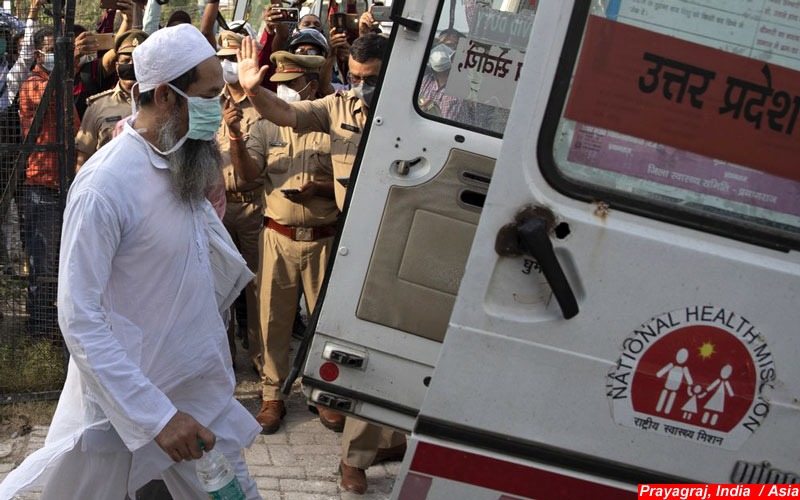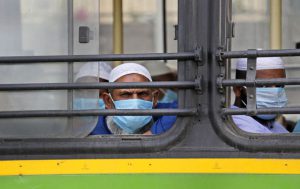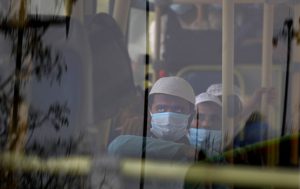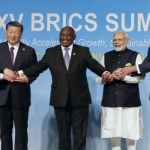
NEW DELHI (AP) — India’s government is blaming an Islamic missionary meeting for a surge in coronavirus cases, triggering a wave of violence, business boycotts and hate speech toward Muslims that experts warn could worsen the pandemic in the world’s second-most populous country.
The stigma faced by India’s Muslims, poorer and with less access to health care than other groups, is making health workers’ battle against the virus even tougher, according to veterans of other epidemics. India has about 24,500 confirmed coronavirus cases — about one in five of which have been linked to the missionary meeting — and 775 deaths, and the outbreak may not peak until June.
“Not only is the (Muslim) community at a higher risk of being infected, but they will also be at a high risk of spreading the virus,” said Dr. Anant Bhan, a bioethics and global health expert. “It becomes a cycle that will continue.”
About 8,000 people in the Tablighi Jamaat congregation met for three days in March at the group’s compound in the crowded Nizamuddin area of New Delhi, shortly before the Indian government banned large gatherings. The compound stayed open, later giving shelter to people stranded in a 21-day lockdown imposed by Prime Minister Narendra Modi on March 24, according to the Jamaat’s spokesman.
On the second day of the lockdown, a government raid on the compound discovered the largest virus cluster in India. Police filed a case against some of the group’s leaders for violating the ban, a charge the group denies. Officials said Tuesday they have arrested 29 people, including 16 foreigners, who participated in the missionary meeting.

India’s communal fault lines, still stressed by deadly riots over a new naturalization law that excludes Muslims, were split wide open by the allegations against Jamaat.
Politicians in Modi’s ruling Bharatiya Janata Party were quoted on TV and in newspapers describing the Jamaat incident as “corona terrorism.”
Lav Aggarwal, joint secretary of India’s health ministry, repeatedly called out the congregation by name in daily news briefings. On April 5, he said the number of virus cases was doubling in just 4.1 days, and would have been a slower 7.4 days “if the additional … cases due to the Tablighi Jamaat meeting would not have arisen.” According to official sources more than 400 members of the Tablighi Jamaat are still untraced or switched off their mobile phones, a search team has been formed to trace them amid the coronavirus outbreak.
According to Aggarwal, among the total figure in India, 23 percent cases are related with the members of the Jamaat being treated in various hospitals and quarantine centers in India. Many members of Jamaat who found positive, lost their lives due to deadly virus. A members from South Africa, Malaysia and Nigeria participated in Jamaat’s congregation also reported to be dead due to covid-19. Members were participated in the Jammat’s congregation in New Delhi, India, a local media reported. Tablighi jamaat has members in more than 150 countries.
A local media reported – amid the ongoing crisis, the health workers, medical teams of doctors and law enforcement agencies are being attacked in many areas. The Govt authorities sent these team to take preventive medical assistance for those who recently came from foreign trips. The state officials also requested citizens and foreigners who are Jamaat members or any individuals to come forward for medical emergency.
Doctors who studied previous epidemics warn that stigma and blame for a contagious disease weaken trust in marginalized communities, threatening decades-long efforts against illnesses such as polio and tuberculosis by making people less likely to seek treatment.
Stigma in general is adding to India’s coronavirus death toll, said Dr. Randeep Guleria, head of the All India Institute of Medical Sciences in Delhi and among the architects of the country’s response.
“It is actually causing increasing morbidity and mortality. Because of the stigma that is happening, many patients who have COVID-19 or who have flu-like symptoms are not coming forward,” he said.

The government in Maharahstra, a coalition with Congress, NCP, Communist and Shiv Sena — the state with the biggest concentration of coronavirus cases — said Muslim-majority areas had a “paucity of health facilities” in a 2013 report. It said the “threat of communal riots” forced Muslims to “live together in slums and ghettos” where social distancing is often impossible.
In deeply polarized India, some Modi critics have suggested that the government singled out the Jamaat congregation for strategic reasons.
On Sunday, Modi tweeted that the coronavirus does not discriminate based on race, religion or creed.
“Our response and conduct thereafter should attach primacy to unity and brotherhood. We are in this together,” he said.
The Organization of Islamic Cooperation’s human rights body condemned the “unrelenting vicious campaign in India maligning Muslims for spread of COVID-19.”
____
Newsroom | theworldmail.co.uk
Source/Contribution/Photo credit by Associated Press






